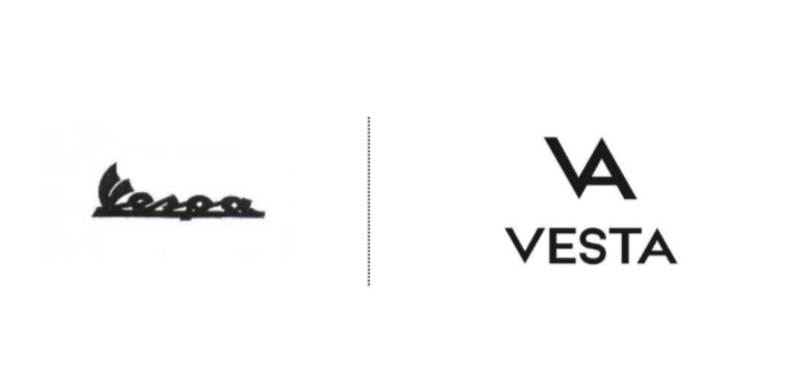
Reputation Isn’t Everything – Or Is It?
That’s why Piaggio finally lost its fight over the European VESPA // VESTA matter.
We had the opportunity to successfully resolve a conflict that involved some complexity, especially in the field of fashion and accessories, in which the strength of a well-known brand (Vespa) in a certain commercial sector (two-wheelers, class 12) and its alleged acquired potential to defeat any new (possibly similar) brands could go, even possibly similar ones (Vesta) although intended to cover products and services in different fields (fashion, classes 18 and 25).
The brands at issue are these below:

The defensive arguments provided by our lawyer Luigi Carlini have been fully supported and recognised by the EUIPO Opposition Division, which on 10/10/2022 completely rejected opposition B 3060483 filed by Piaggio SpA against Luxor Srl. This decision has not been appealed by Piaggio, therefore we can consider it as firm.
According to the EUIPO, while the segment of the public affected by part of the goods and services covered by the conflicting marks is the same, or overlaps to some extent, those goods and services are so different that it is unlikely that the latter mark may evoke the earlier mark in the minds of the interested public.
The products and services in question belong to completely different market sectors. They differ in their nature, purpose, commercial origin, distribution channels and are not complementary among themselves. Contrary to what the opponent Piaggio asserted, the products in question are not usually sold as accessories for scooters or motorcycles in general, nor as marketing products such as, for example, clothing. In fact, none of the products to which the opponent refers and which appear in the catalogs and invoices presented for proof of use contain any reference to the contested products or to the products included in the contested sales services. The opponent has also not been able to prove the use of the earlier marks in relation to goods in classes 18 and 25.
When a trademark is well-known, the degree of relationship between products and services does not have to be high. However, there has to be more than similarities between brands to show this. The opponent has the onus to present convincing evidence that the new business represents an expansion, and not simply an unrelated addition to the opponent’s new trademark as to the goods and services for which the applicant is seeking registration. Absent such proof of natural expansion, the opponent would assert a full right to a mark.
In addition, it must be taken into account, as described above, that the marks at issue present clear conceptual differences for the relevant public that will allow the consumer to clearly distinguish them from each other and, therefore, it is not considered likely that the contested sign is reminiscent of the former mark.
Therefore, the EUIPO concludes that it is unlikely that the relevant public would establish a mental link between the conflicting signs, that is, establish a “nexus” between them.
Therefore, the opposition is unfounded within the meaning of Article 8(5) EUTMR and must be rejected.
This decision undoubtedly sets an important precedent. Professionals in the sector, keep it in mind!

Letslaw es una firma de abogados internacionales especializada en el derecho de los negocios.







